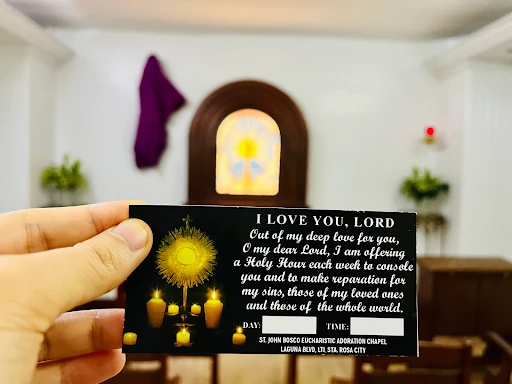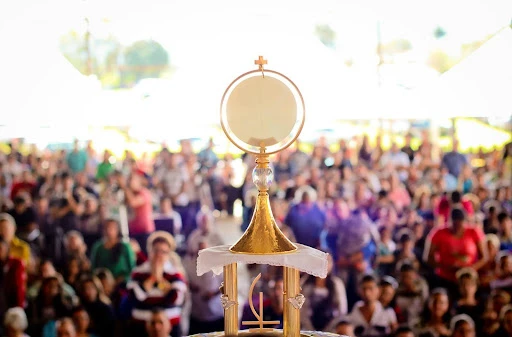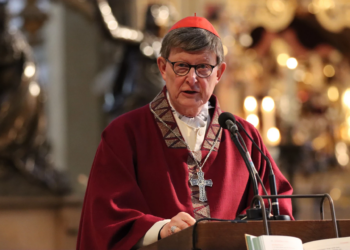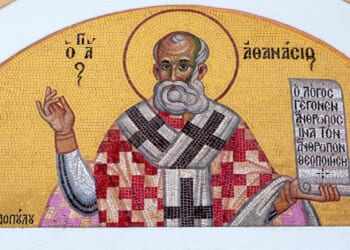Manila, Philippines, May 27, 2025 /
06:00 am
As the National Eucharistic Revival comes to an end in the United States this year, many believe there is a need for a global Eucharistic revival in other parts of the world — including the Philippines.
Empty adoration chapels in the majority-Catholic country and lack of belief in the Real Presence are leading more parishes to implement a simple initiative called the “Holy Hour Pledge” and call for more catechesis.
Filipino-American priest Father James Cervantes of the Marians of the Immaculate Conception (MIC) lamented the phenomenon throughout different parishes across the Philippines, despite its renown as the largest Catholic nation in Asia and the third largest in the world.
“I came here to Manila just a year and a half ago. I noticed there are a lot of adoration chapels where Jesus is exposed, but they’re empty and abandoned. I was puzzled. I thought, ‘OK, maybe this is just one.’ But then I visited another church and another, across different cities — and again, Jesus was exposed, but they were all empty. In the U.S. and in Poland, this wouldn’t even be allowed. All I could think was, ‘Oh Lord, no one is in here, I’m so sorry Lord.’”
Cervantes recounted a tragic situation in one of the Manila parishes whereby the monstrance — with the consecrated host — was stolen by thieves inside an empty adoration chapel.
How can a deeply devout nation like the Philippines be devoid of adorers? Cervantes said it is only a symptom of a deeper problem.
“Empty adoration chapels are symptomatic of a deeper problem. People here are hungry for the faith; they actually want to know what the Church teaches, but there is a lack of catechesis and faith formation,” the priest told CNA.
For many Filipino Catholics, the faith is merely practiced in external rituals — but a deep relationship with Jesus, and a strong catechesis, is lacking.
This is not only a Philippine problem but also a universal one. Even in Catholic-majority countries like Brazil and Mexico there has been a reported upsurge in Catholics leaving the faith for Protestant denominations due to a lack of faith formation and personal relationship with Christ.
Both the Pew Research Center in “Religion in Latin America” (2014) and Premier Christian News in “Evangelicals Poised to Outnumber Catholics in Brazil” (2025) have reported on the decline in Catholicism and growth in Protestantism in Latin America, mainly due to “a lack of personal encounter with Christ” leaving them spiritually hungry and vulnerable to conversion. By contrast, evangelical churches often emphasize personal conversion, relationship with Jesus, and Bible study, filling the void left by poor catechesis in Catholic communities.
A Catholic who came back to the faith in the Philippines who preferred to remain anonymous shared with CNA that he felt he wasn’t being “fed” in the Catholic Church and hence had sought what he was hungering for elsewhere.
“In evangelical churches, we have Sunday school and Bible studies and discipleship groups keeping us in touch with our faith,” he shared. “I was hungry for Jesus. I wanted to grow more in my faith, but there are not many opportunities for ongoing formation in the Catholic Church, so I sought for that in evangelical circles.”
What brought him back? The Eucharist.
“Despite all the charismatic preaching and music and evangelism, something felt void and lacking. We didn’t have the Eucharist,” he said. “It was the Eucharist that brought me back to the Catholic faith, and it’s the Eucharist that makes me stay.”
“When I truly understood the meaning of the holy sacrifice of the Mass, and the real presence of Jesus in the Eucharist, there was just no going back. If I hunger to be ‘fed,’ it makes sense that none other than Jesus in the Eucharist can do that for me. Without the Eucharist, something just felt deeply missing.”
Cervantes agreed. “The Mass is the most powerful act of worship you can participate in on the face of the Earth. There are parishes which are vibrant, full of life, full of spirit … They’re so alive. You can just tell there’s a difference. We need to go back to the basics — more reverent Masses and good preaching.”
(Story continues below)
Subscribe to our daily newsletter
“People are coming to Sunday Masses anyway, so we as priests need to make use of that opportunity to give them basic catechesis right then and there. There is a real need for priests to emphasize the doctrine of the real presence of Jesus in the Eucharist. There needs to be a re-catechesis of the most basic foundations of the Catholic faith,” Cervantes added.

A simple solution: the Holy Hour Pledge
In response to the crisis in Eucharistic belief and catechesis, various parishes across the Philippines implemented a simple but concrete solution: a “Holy Hour Pledge” initiative, which has seen remarkable success.
One such parish is the St. John Bosco Parish and Center for Young Workers in Santa Rosa, Laguna, Philippines. Outside its perpetual adoration chapel are pledge cards in which anyone can sign up and pledge one hour a week to accompany Jesus in the Blessed Sacrament.
Parishioners sign two wallet-sized pledge cards that read: “I love you, Lord. Out of my deep love for you, O my dear Lord, I am offering a Holy Hour each week to console you and to make reparation for my sins, those of my loved ones, and those of the whole world.” At the bottom of the card, one commits his or her chosen day and time each week for the Holy Hour.
One card is dropped into a dropbox outside the adoration chapel while the other is kept in the person’s wallet or on the refrigerator door as a reminder of his or her weekly pledge. Since the initiative began, the parish reported a significant rise in the number of visitors.
“It works because they are pledging not to any staff or person but to the Lord himself,” said Johanna Adaza, head of staff at the Archdiocesan Shrine of Divine Mercy in El Salvador, Philippines, which has also implemented its own Holy Hour initiative. “What we noticed is that most people adoring Jesus in the Blessed Sacrament are old people.”
“There is a lack of formation in the younger generations, and so we need to re-catechize the youth,” she said.
A youth from a Manila parish shared: “We want to grow in faith. We long to understand the beauty of the Mass and the holiness of the Eucharist. But some Masses feel more like shows than sacred moments. Reverence is replaced with entertainment or jokes. We go to Mass because we’re looking for something deeper. We’re hungry for the Word, for meaning, for reverence … I hope priests will really prepare their homilies. It may be as short as five minutes but substantial. The homily is the catechism for some and the only time to know about the faith. Some homilies bring us to ‘aha’ moments.”
Kent, a 25-year-old adorer at St. John Bosco Parish, told CNA: “I used to feel depressed and so senseless. A friend suggested to me to visit the Blessed Sacrament for even just 15 minutes a day. I thought it was an absurd proposition, but I decided to take him up on it. After a while, I started to notice the difference. I couldn’t live without it. I committed to one hour a week on my pledge card, but I started going every day. I wanted to be face to face with Jesus as much as I could. As St. John Bosco, our parish’s patron, would always say: ‘Frequent visits to the Blessed Sacrament will turn ordinary men into saints!’”

















